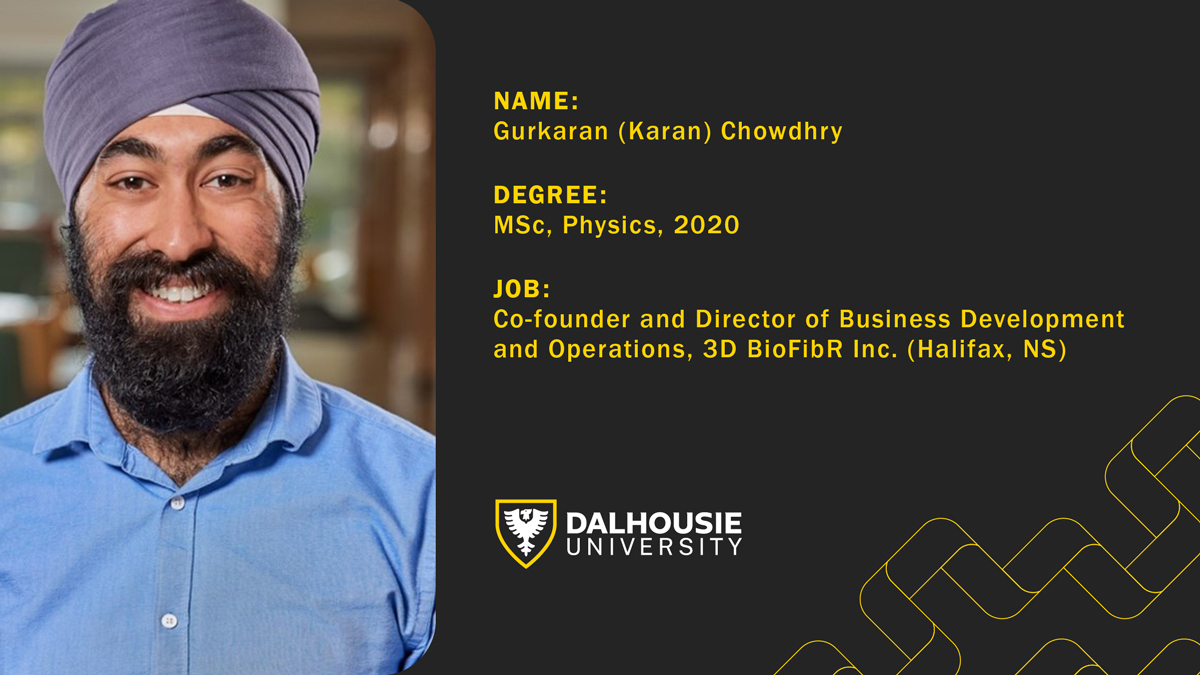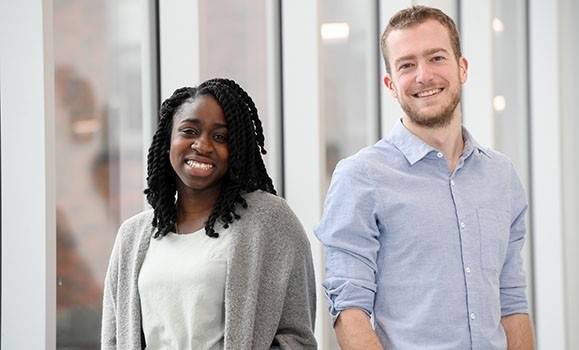Physics
The Department of Physics and Atmospheric Science at Dalhousie University is one of the best university-based research centers in Canada. Complete your undergraduate degree as a major, or consider completing an honours or co-op degree and/or earning one or more certificates if certain courses are taken as part of the program.
Students also have the option to specialize among nine exciting sub-disciplines in physics: astrophysics, computational physics, biophysics, environmental physics, materials physics, applied materials, theoretical physics, leadership in physics, and medical physics.
Your major map: Physics
The Physics Major Map highlights academic and co-curricular opportunities and provides an overview of how students can customize their degree. Students are encouraged to connect with advising supports at Dalhousie and use the Academic Calendar and Timetable to create their course plan.
< 30 CREDIT HOURS/FIRST YEAR
- Complete required introductory courses in Physics (PHYC 1190/1290) and in other subjects. See the first-year course planner worksheet for more information
- At the end of your first year, you can declare your major and register for second-year courses
30-60 CREDIT HOURS/SECOND YEAR
- You will start taking more core courses* in PHYC gaining knowledge and lab experience: PHYC 2050, PHYC 2140, PHYC 2150, PHYC 2510, PHYC 2515
- Consider combining your degree with another subject with a double major, minor, or certificate
60-90 CREDIT HOURS/THIRD YEAR+
- Aim to take 4-6 PHYC courses*. Make sure you're on track with course requirements using DARS
- Apply for an honours degree ahead of your fourth year if you are considering graduate studies
90-120 CREDIT HOURS/FINAL YEAR
- In your final year, you should be taking 4-6 PHYC courses*
- Complete any requirements for a certificate or minor and check your degree audit to ensure you are on track to graduate
- Apply to graduate by Dec 1 for spring convocation and July 2 for fall convocation
*Note that not all courses are offered each semester or year and that course requirements may vary according to your degree type (major, double major, minor, honours). Be sure to keep track of these by consulting the academic calendar.
*After declaring your major, we strongly encourage you to connect with program advisors for course planning and any other questions related to your program.
< 30 CREDIT HOURS/FIRST YEAR
- Build connections by enrolling in a first-year interest group (FIGS) like Oceans, Climate Change, Earth and Environment and Innovation and Entrepreneurship in Science
- Sign up to be mentored by an upper-year student
30-60 CREDIT HOURS/SECOND YEAR
- Explore the myCareer portal to browse through work and volunteer opportunities on and off campus
- Combine academic study and paid career-related work experience by enrolling in co-op
60-90 CREDIT HOURS/THIRD YEAR+
- There are 70 Faculty-coordinated summer research awards available each year that you can apply for on a competitive basis
- Other opportunities include science communication internships, science innovation and entrepreneurship through SURGE, and student society leadership roles
90-120 CREDIT HOURS/FINAL YEAR
|
< 30 CREDIT HOURS/FIRST YEAR
- Attend the Dal Science Welcome Party
- Attend the Faculty of Science Program Fair for help planning your next steps
- Consider joining DUPS – Dalhousie Undergraduate Physics Society! Meet other like-minded students and participate in fun events
30-60 CREDIT HOURS/SECOND YEAR
- Reach out to the Department's many world-class researchers and faculty to join a research lab as a volunteer
60-90 CREDIT HOURS/THIRD YEAR+
- Consider running for a position with the Dal Science Society's Executive or with your student society
90-120 CREDIT HOURS/FINAL YEAR
|
< 30 CREDIT HOURS/FIRST YEAR
|
30-60 CREDIT HOURS/SECOND YEAR
- Explore career paths and industries that spark your interest by attending an alumni panel discussion
60-90 CREDIT HOURS/THIRD YEAR+
- See which scholarships and prizes might be available to you through the department, on a competitive basis
90-120 CREDIT HOURS/FINAL YEAR
- Time to celebrate your achievements and graduate!
- Connect with the Bissett Student Success Success Centre career supports to get prepared for interviews, and more as your prepare to head out on the job hunt or to apply for graduate school
For any questions about your major, enrolling in a minor or certificate, summer research, or honours, speak with a program advisor!
Where your degree can take you
The skills and knowledge acquired through this program provide great preparation for a variety of careers and can be applied, but not limited to career paths in:
Aerospace, research, energy, engineering, health care, technology, computer and game design, consulting, and education among many more.
A BSc degree in Physics will prepare you for further studies in various sciences such as physics, engineering, or meteorology. Students could go on to study Optometry (OD), a Master of Science (MSc), a Master of Engineering, and eventually a Ph.D.
Core competencies gained
Discipline-level skills:
- An understanding of the fundamental elements of the universe, energy, and matter and their properties, structures, movements, and behavior in time and space
- Knowledge of key topics in the different sub-disciplines of physics, such as astrophysics, biophysics, and materials physics
- An understanding of the law of nature and the different classical and modern theories in physics
Transferable skills:
- Academic writing and presentation skills
- Critical thinking, synthesis, and analytical skills
- Communication skills
- Numeracy skills
- Time/project management
- Leadership and teamwork
- Basic statistical analyses
- Laboratory techniques
Possible careers and employment
Physics Alumni can be employed within a variety of industries and have multiple career path options. These are influenced by the student's elective courses, experiential learning choices and certificates. Some of the options below will typically require additional or graduate-level training*, while some can be pursued following the completion of baccalaureate program only.
- Analyst
- Aviation inspector
- Astrophysicist*
- Biophysicist*
- Computational scientist*
- Data scientist*
- Design engineer*
- Energy policy analyst*
- Health physicist*
- Game designer
- Geophysical surveyor*
- Meteorologist*
- Medical physicist*
- Nuclear physicist*
- Nanotechnologist*
- Optical technician
- Optometrist*
- Research technician
- Laser engineer*
- Software engineer
- Technical writer
- Teacher/professor*







